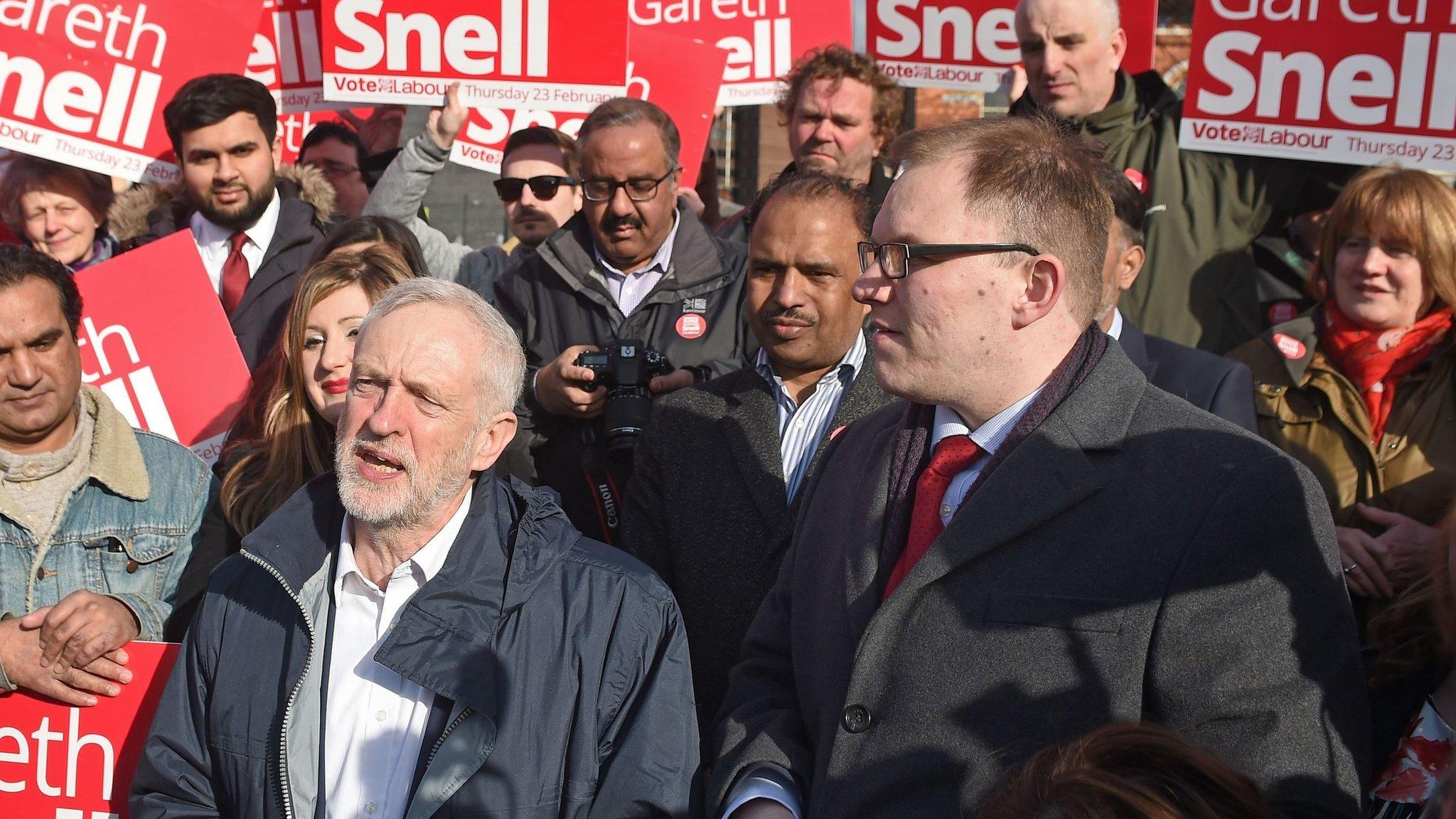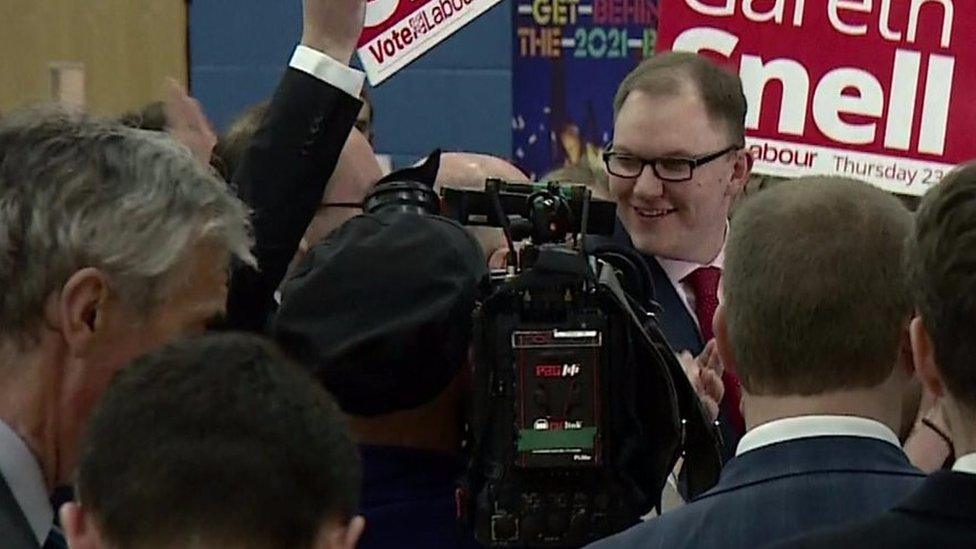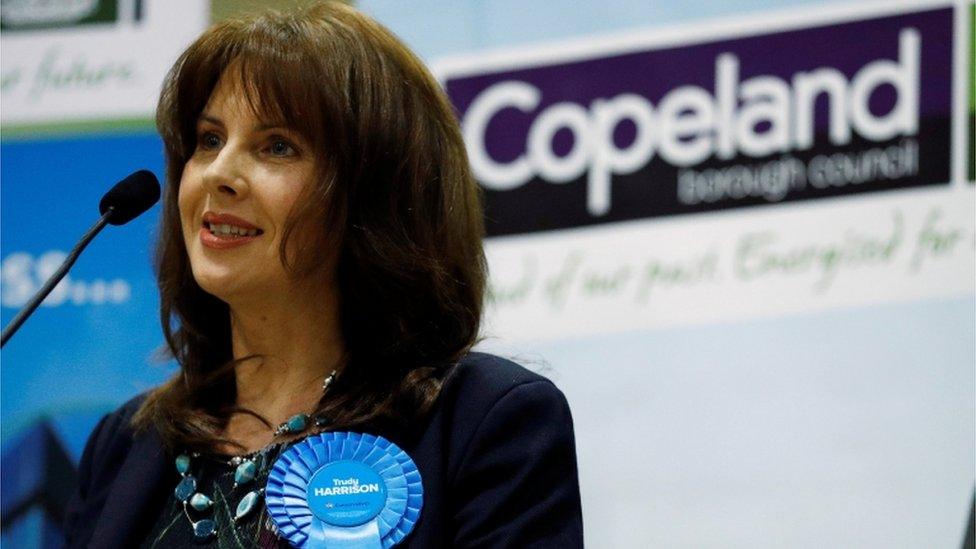Jeremy Corbyn: 'I will not step down' over poll loss
- Published
- comments
Jeremy Corbyn: "It's a day of disappointment in Copeland"
Jeremy Corbyn says he will not step down following Labour's Copeland by-election loss to the Conservatives.
The Labour leader said the result was disappointing but he had been elected twice and was "proud" to continue.
Shadow chancellor John McDonnell claimed there were "mixed views" about Mr Corbyn's leadership but the defeat in Cumbria was not "about individuals".
But MP John Woodcock said the party was facing an "historic and catastrophic" defeat at the next general election.
The Conservatives seized the Cumbria seat for the first time in more than 80 years.
Their victory was the first by-election gain by a governing party since 1982.
'Need to rebuild'
But there was happier news for Labour in the Stoke-on-Trent Central by-election where Gareth Snell held off the challenge of UKIP leader Paul Nuttall to regain the seat.
John McDonnell, Labour's shadow chancellor, tells Today the Copeland result is "really disappointing"
Mr Corbyn said while it was "a day of disappointment in Copeland" he would not be quitting as Labour leader. Asked if he would fall on his sword following the defeat, he said: "No. I was elected leader of this party - I'm proud to lead this party."
And later in Stoke, Mr Corbyn congratulated new incumbent Mr Snell, arguing that despite media attempts "to write off" the party, Labour had won with a message "that hope triumphs over fear".
Asked by BBC Radio 4's Today programme if Mr Corbyn had been the problem in Copeland, Mr McDonnell said while he conceded there were "mixed views on Jeremy", the result was not about individuals and the Labour leader was not considering his position. "He's never said that," he said.

Analysis by Iain Watson, political correspondent
Labour's failure to retain Copeland for the first time since the seat was created highlights three interlinked problems for the party.
The most serious is trust - or lack of it.
Labour insiders tell me they "got Jeremy to the right place on nuclear" - by not just committing to retaining the industry but also no longer opposing new capacity.
Yet very few voters here in Whitehaven that I spoke to this morning believed him - and some were still unaware of his position. Read more

"He's a different type of leader. He is that sort of person who does listen, who is decent and honest and does bring people together.
"He's not the sort of macho leader we've seen in the past, and that's why we've had the disasters that we've had," he said.
"Our party has got to rebuild itself from the grassroots in the communities like Copeland."
Blair advice
Mr McDonnell said Mr Corbyn "wants to serve this community and he'll do it well once he becomes prime minister... because he understands how people feel in places like Copeland".
But he urged the party to unite, and said Mr Blair's speech a week ago, in which he claimed the "debilitation of the Labour Party is the facilitator of Brexit" had not been helpful.
Labour MP John Woodcock tells Radio 4's Today the Copeland result is a disaster
"We cannot have a circumstance again where a week before the by-election a former leader of our party attacks the party itself," he said.
Pressed on whether he was blaming Mr Blair for the by-election defeat, Mr McDonnell said: "It's not his fault. I'm just saying, advice: please don't do that.
"And the same to Peter Mandelson - three days before a by-election he attacks the party. What I'm saying is the central principle of how you win elections is you have a united party, you do not divide the party."
'In trouble'
But Dave Prentis, general secretary of Labour-supporting Unison - Britain's biggest union - said neither the Stoke nor Copeland by-election results were good for Labour.
"The blame for these results does not lie solely with Jeremy Corbyn, but he must take responsibility for what happens next," he said.
"Nurses, teaching assistants, care workers and ordinary people everywhere need a Labour government. Jeremy has to show he understands how to turn things around and deliver just that."
John Woodcock, Labour MP for Barrow, the neighbouring constituency to Copeland, said the defeat there showed the party was "in trouble".
Asked if Labour could win the next general election, he told Today the party was "actually on course to a historic and catastrophic defeat".
The MP said it would be "counter-productive" for him and other critics of Mr Corbyn to demand another leadership election when the outcome was likely to be another victory for Mr Corbyn.
"Jeremy Corbyn is going to remain leader of the Labour Party unless he decides that he thinks that it is right to go," he said.
Popular politician?
Veteran Labour backbencher David Winnick said the Copeland result had been "disastrous" for the party and urged Mr Corbyn to consider his position.
"The party is faced with the problem of a leader who is simply not acceptable to a large number of people who would normally vote Labour. That it is an obstacle and it would be wrong not to recognise that," he said.
"It is now entirely up to Jeremy and those close to him to decide what is best in the interests not simply of the party but the people we are in politics to represent."
But political scientist Prof John Curtice, of Strathclyde University, told the BBC that even if Mr Corbyn were to go, unless a credible contender came forward, "it's not entirely clear Labour's problem would be solved".
However, Ian Lavery, Labour's campaigns and elections chairman, insisted Mr Corbyn and his anti-nuclear stance in a constituency that relies on Sellafield's nuclear processing facility, was not the problem. He claimed the Labour leader was "one of the most popular politicians in the country".
"The issues in Copeland weren't about Jeremy Corbyn," he told BBC2's Daily Politics. "The issues in Copeland were about the jobs and the economy and the people are worried about this."
- Published24 February 2017

- Published24 February 2017

- Published24 February 2017
